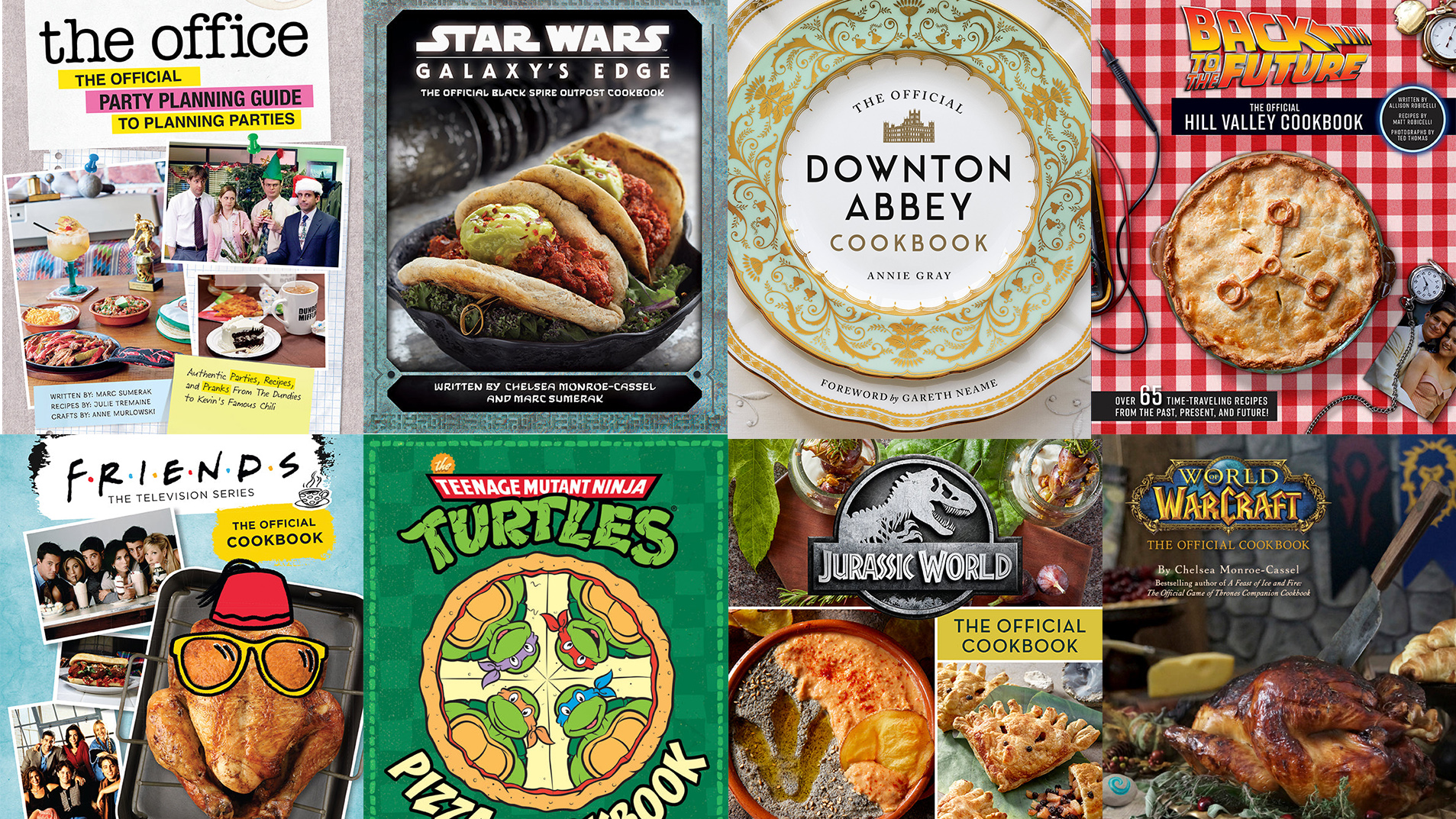The Quiet Explosion Of Pop Culture Cookbooks
Cooking the foods from our favorite shows and movies is a growing business.
While browsing the cookbook section at my local Barnes & Noble, I discovered, hidden below books about grilling and regional cuisine, a cookbook with a cartoon character on the cover. Set against the backdrop of a bright illustrated kitchen, the book was called Gudetama: The Official Cookbook—Recipes for Living a Lazy Life by Jenn Fujikawa, a lifestyle blogger and content creator with several pop culture cookbooks to her name. But at the time, I didn't know any of this yet.
Gudetama, known as the "lazy egg," is one of the many adorable characters created by Sanrio, the same company responsible for Hello Kitty. But the Gudetama cookbook wasn't the only one that caught my attention. When I looked around me, I saw almost an entire bookcase filled with everything from Gilmore Girls to Friends to Downton Abbey to Harry Potter to Game of Thrones to Parks and Recreation to Bob's Burgers to Marvel's Wakanda. All appeared to be beautiful, hardbound keepsakes for the kitchen.
In prior years, there weren't a lot of pop culture cookbooks at my local bookstores. Nowadays, there are no shortage of choices. It seems as though every popular movie or TV show has been turned into a cookbook. How did this become the norm?
How pop culture cookbooks gained momentum
Pop culture cookbooks first appeared in the 1970s with titles such as Little House on the Prairie Cookbook and The Partridge Family Cookbook. For years, such collections were considered novelty items—something akin to a coffee table book, pretty to look at but not necessarily cook from. However, in the mid-2000s, The Sopranos Family Cookbook (2002) ended up selling more than 142,000 copies. Meanwhile, The Unofficial Harry Potter Cookbook (2010) sold more than a million copies, giving the publishing world a firm indicator that there might be a market for pop culture cookbooks after all.
Fast forward another decade to 2020. While the pandemic was detrimental to public health, it was a highly profitable time for the publishing industry. Print book sales were the highest they'd been since 2010, accounting for an 8.2% increase year over year. Perhaps unsurprisngly, many of the books sold were in the DIY and cookbook categories. In 2021, cookbook sales saw a 42% spike for baking cookbooks specifically.
This strong increase in book sales can be attributed to a variety of factors, but many industry experts point to the pandemic as the main source. With more time at home to watch, cook, and eat, people suddenly want cookbooks. They also want cookbooks with stories. Pop culture cookbooks essentially became "encyclopedic examinations of the universe of a show, movie or game — with recipes," as the New York Times puts it.
Many of these books are published by Insight Editions, a publisher based in San Rafael, California who specializes in pop culture cookbooks. The company's unique licensing agreement has allowed it to procure an impressive portfolio. (Full disclosure: former Takeout staff writer Allison Robicelli has written multiple titles for Insight Editions.) The recipes developed specifically for these books came from food bloggers, writers, chefs, and content creators who bill themselves "enthusiastic fans" and the collections come with fun illustrations, graphics, and direct quotes from the movie or show, paired with clever titles such as Chandberry Sauce and Rachelrita (the Friends cookbook), Sookie's Survival Margarita (the Gilmore Girls cookbook), and I Know Why the Cajun Burger Sings (the Bob's Burgers cookbook).
The future of cooking as a fan
Today's cookbooks are much more narrative-driven than they used to be. Instead of a straightforward collection of recipes, they are "heavily researched tomes about their fictional worlds," wrote Priya Khrishna in the Times.
"They consider climates and character motivations," she explains. "They fill in gaps in the narrative. Authors pore over every element — down to the props in recipe photos — so fans can feel fully immersed." In other words, a good pop culture cookbook gives you the recipes while also letting you experience the world of the story you love.
It's fun to imagine what your favorite characters might eat in their fictional worlds. But what about cooking the foods as a real person, in real life? Some recipe testers aren't so convinced that these cookbooks are a practical guide to immersing yourself in these narratives. Gawker writer Kelly Conaboy wrote about the impracticality of the Gilmore Girls Cookbook, stating, "Gilmore Girls is a fantasy in many ways, it's true; no one can eat like this, or cook like this."
Naomi Fry, staff writer for the New Yorker, echoed a similar sentiment about The Unofficial Simpsons Cookbook. "I briefly wondered whether the book was made for actual cooking," she wrote, "or whether it was intended, first and foremost, for fans to thumb through and recall their favorite 'Simpsons' moments." (For what it's worth, The Takeout thought the recipe for Krusty Brand Imitation Gruel was fun and worth sharing, even if it doesn't make it into any home chef's regular rotation.)
Couldn't this fairly be said of a number of other cookbooks, too? Has no one purchased a copy of The Barefoot Contessa Cookbook in order to imagine an aspirational life in the Hamptons, even if they don't cook very many recipes from its pages?
Regardless of whether you purchase these cookbooks for fun or for sustenance, there will soon be a Neopets cookbook and books based on CATAN and Ticket to Ride board games, showing the world that, yes, just about any movie, book, TV show, or video game can be expanded into a cookbook. Even Emily in Paris is getting the cookbook treatment this August. To this we say: Why not?
